Healthy living isn’t easy. For those folks who are already overweight — large enough that it’s difficult or even painful to do what other people can do — it’s even tougher to get started. Here are some helpful tips.
Pictures: Peter Bernik (Shutterstock), Frances L Fruit (Shutterstock), imtmphoto (Shutterstock), AMA (Shutterstock), Drajin, bikeriderlondon (Shutterstock)
I’ve struggled with my weight ever since I was a teenager. Not necessarily from a health perspective — I’ve always been healthy — but I’ve struggled because I want to look better, feel more energetic and get all of those great benefits that you get from being fit. However, when you’re already overweight, a lot of the activities that other people just pick up without trying are either impossible or feel like death. High Intensity Interval Training? Hot yoga? Insanity? Crossfit? Even jogging? You have to be kidding.
It’s not that those workouts don’t work. It’s that doing them when you’re a beginner or overweight enough that they do more harm than good is a ticket to hating, giving up early and feeling ashamed for even trying. Keep in mind, we’re not just talking about someone who’s a tad overweight, where you can push past the discomfort. We’re talking about those of us who have enough extra weight on our bodies that jumping into a running regimen or Crossfit workout is painful and can be harmful.
I talked to two fitness experts and friends of Lifehacker to get some tips: Dick Talens, co-founder of Fitocracy and personal trainer for Miss America 2013, and Roger Lawson II, fitness expert and trainer behind Rog Law Fitness and creator of the Lifehacker Workout.
Before You Begin: Cut Yourself Some Slack
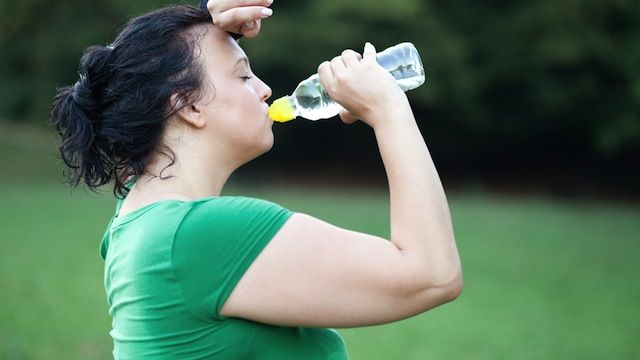
This may perhaps be the single most important tip to ensure your success: Approach everything you do from a place of self-compassion. It may sound silly, but there’s hard science to back up the idea. Dick explains:
Those who beat themselves up for getting to the point that they’ve gotten to are more likely to fail. There is a very scientific reason to this. If you come from a place of guilt, then you exhibit a fixed mentality rather than a growth mentality. Any slip ups that you have along the way are therefore viewed as a character failure. Research shows that self-compassion, however, allows you to think of exercise with a growth mindset — as a skill — something that you can improve. From an email to a client of mine:
“One last thing I want to mention… Being overweight is not a character flaw by any means.”
Too frequently, will people think that they’re overweight because “something is wrong with them”, and that’s the furthest thing from the truth. Unfortunately, when these people fail on their diets, they’ll continue to think that something is wrong with them and beat themselves up.
Popular weight loss stories on TV almost always start with someone “fed up” with their looks or health problems. While those things can be triggers, they’re never motivators that stand the test of time. Dismiss the people who will tell you to “just go to the gym”, or “just put down the fork”, or that it all boils down to “eat less and move more”. Soundbites don’t keep you motivated.
Focusing on your clothes size, waistline, reflection in the mirror and so on are all short-term motivators that don’t adapt with you. Relying on them guarantees any stumbles you have along the way will make you feel horrible about yourself and take you back to square one. Instead, concentrate on the long-term benefits, and use the immediate ones as a motivational push. In short, make your fitness plans because you love yourself and want to be the best, most healthy possible you that you can be.
Healthy Living Is a Skill You Improve At, Not a Thing You Just “Do”
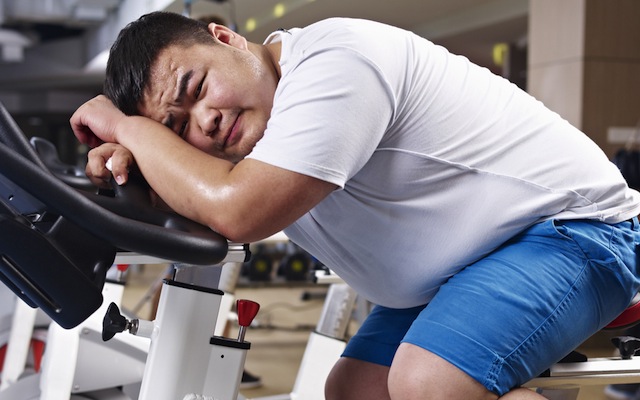
The next thing someone to remember is that a healthy lifestyle is a skill you work and get better at — not a thing you just get up and start doing one day. If you expect to just hop on a stationary bike, start lifting, or turn your diet upside down without challenges, you’re setting yourself up for trouble. Approach your health and fitness goals like you would any other skill that you’re learning. Dick explains:
If you fell and scraped your knee the first time you attempted to ride a bike, you wouldn’t beat yourself up and say “Shit, something is horribly wrong with me… I just don’t have the willpower and discipline required to ride this bike,” would you? Nope, you’d realise that you just don’t have that skill yet. You just need to get better at it and learn how to control the bike when you hit different terrain… a bumpy road or a patch of grass, for example.
How silly is it that when people attempt to lose weight — often by reducing it to “eat less, move more” — then fail, they think that they’re lazy? Undisciplined? They feel guilty and horrible about themselves, rather than think about what caused them to slip up — how to control the bike past a new terrain.
If there’s one thing that you take away from all of this, it’s that losing weight is a skill… a composite of underlying skills like mindfulness or nutritional knowledge. There’s one more important implication — You can go ahead and forgive yourself for any past slip-ups. It’s important in this entire journey to be self-compassionate.
Most people don’t expect to be able to do difficult things without training, whether it’s a new job, playing the piano or learning a language. There’s no reason to expect that when it comes to exercise, diet, nutrition or any other element of healthy living. Remember, the goal is to make positive changes that stand the test of time. Short-term weight-loss plans, bursts of exercise and fad diets have been proven over and over again to be ineffective.
Find Something You Enjoy Doing, and Start From There
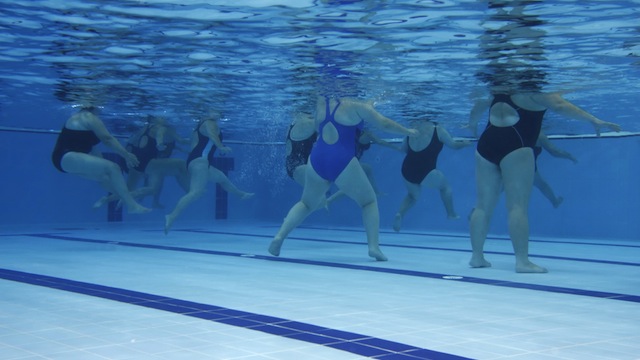
Getting into the right mindset is only half the battle. The rest, obviously, is actually putting your plans into motion. If you’re already struggling with your weight, or if you have no idea where to start, this can be one of the biggest hurdles to get over. What kind of exercise should you do, and how much? How can you tell if it’s working? How can you get the biggest bang for your diet and exercise buck?
Frankly, the best response to all of these questions is to ignore them. If you focus on results out of the gate, or think in terms of optimal benefit instead of building habits, you’re already on the wrong track. I’ve known people who took up running or spinning because they thought that’s what they had to do. They hated it but kept going until something happened and they missed a day. It may have been the holidays, a late meeting or illness, but that was all it took to get them off the horse.
Instead, seek out exercise that rewards you mentally and emotionally as well as physically. Find things you enjoy doing, at any activity level. Don’t get caught up in the “all or nothing” mindset, where you think you have to buckle down and do an hour of cardio or strength training every other day for the rest of your life — start slow with something you know you can do, even if it’s once a week. It’s more important, especially when you’re getting started, to focus on what you can do and step up from there.
Focus On What You Can Do Right Now, Not On the Finish Line
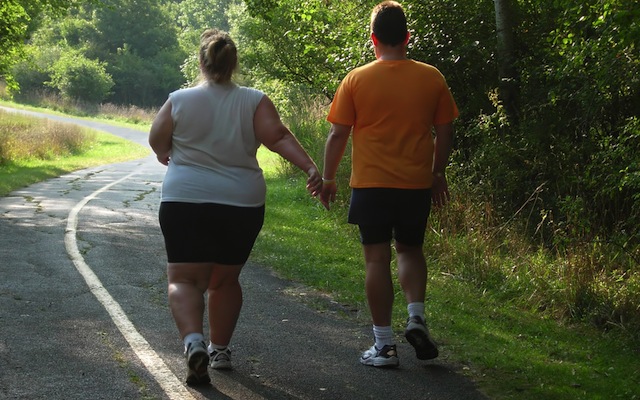
Once you’ve figured out what you want to do — whether it’s a karate class, a half-hour of Wii Fit after work every day, or hand weights while you watch TV — you have to get started. Start slow and focus on what you’re physically capable of. If you’re heavyset or sedentary, don’t expect an explosive start. Roger has a suggestion:
The best piece of advice that I can give is to begin without being in a hurry to accelerate things by doing what others (who have more experience with exercise than you) do. Start where you are with what you have. Initially, this may be limited to a few modified bodyweight exercises such as pushups from counter tops (or other elevated surfaces) and bodyweight squats.
Don’t be discouraged by focusing on what you can’t do yet and instead focus on what you can do. Outside of formal, traditional exercise there are lots of options for movement and activity – walking, ping pong swimming, Wii/Kinect games, etc. The key factor is finding an activity that you enjoy and consistently do.
Combined with a sensible nutrition strategy, this can take you much further than most people would have you believe. Much like a video game, as your fitness improves more options will open up, allowing to do more as you’re ready for it.
Sure, short, light workouts won’t get you in shape, or even all the way to your goals. That’s not the point, though. Starting light — just doing whatever you can, even if it’s not much — is critically important to building good habits, getting you moving, and acclimating your body to activity. Is it all you’ll ever do? No — but it’s a start, and getting started is everything.
Think of Healthy Habits Like a Video Game: Keep Your Life Bar Full
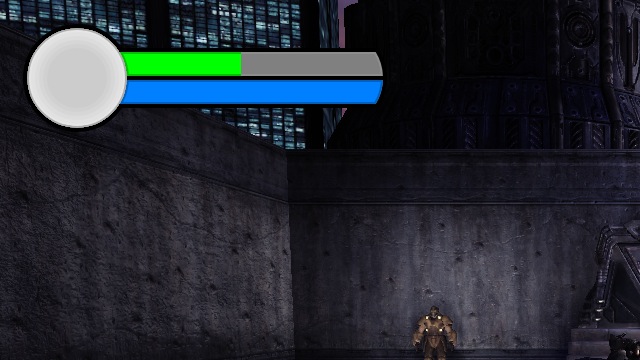
Once you’ve started, listen to your body. You’ll get immediate feedback that will help you adjust and adapt. Dick continues the video game analogy and takes it up a notch:
Imagine that your motivation to lose weight is represented by a life bar in a video game. You know, the ones that decrease when your character gets hit and takes damage. This life bar starts sky high and decreases over time. If it dwindles down to 0, you lose motivation to get in shape. This bar has a few attributes:
- Things that are painful/unenjoyable OR require the use of limited resources like time and willpower decrease this life bar.
- Conversely, seeing tangible results increases this life bar. Tangible results are: Weight lost, inches lost, seeing results in the mirror, etc. Beware for false results like “steps taken.” They may increase your life bar in the short run but once you realise it doesn’t mean anything, they can backfire.
- Things that are done based on “habit” neither decrease nor increase this life bar.
Now, take something an activity like “running”, which no one would ever say is unhealthy, but see what it does to your life bar. For people who are overweight — including my past self — running is a bitch. It makes you sweat and gasp for breath, hurts your knees, and it’s almost like you’re being shamed. These things decrease your life bar. You might see some results from running, but not enough to replenish the damage done.
Going on a diet also decreases your life bar because the way that most people diet makes them hungry, lethargic, etc. But let’s suppose we manipulate someone’s diet to cause as little pain (e.g. hunger) and use as little willpower as possible while still seeing results… Suddenly, you’re NOT draining your power bar very much from dieting but you’re actually replenishing it from results. You’re actually increasing your power bar! This is the concept of the positive feedback loop.
Dick’s last point is key. The “tangible results” he talks about don’t stop at weight loss, either: I find that when I work out regularly, I sleep more soundly, I feel better and have more energy during the day. I deal with stress more effectively, and I’m more motivated to get work done. Those benefits diminish pretty quickly when I miss a few workouts, so I’m pretty motivated to keep up the habit. That feedback feels good — it increases that life bar, even though it takes a few dings when it’s mid-morning and I really don’t feel like exercising.
So how do you use that feedback loop to get into exercise, and to get to your fitness goals? Dick continues:
In order to lose weight, you must create a caloric deficit, that is burn more calories than you consume. There is no way around this; you cannot cheat physics.
Knowing this tenet, you have room to play with how this deficit is created. For example, you can create this deficit through exercise or through diet. If you create this deficit through diet, a high protein intake will keep you full. If you create this deficit through exercise, you can strength train or do cardio. For the most part, an equivalent deficit from biking vs dieting vs ping pong don’t really affect the total weight lost…but they do affect your power bar.
That’s where the secret of getting fit lies. You need to make sure your power bar stays high… protect it at all costs. Sure, playing ping pong might be fun, but if it’s wrecking your joints and causing you pain, it will deplete your power bar. If you really want to get up and get some exercise, take a brisk walk. Don’t feel like you’re taking the easy way out… at 180kg that’s an amazing exercise. Hell I couldn’t do that with a 90kg pack on me.
So many people “think” that they have to exercise/diet a certain way to be fit and don’t ask “why?” They have preconceived notions about fitness. As a result, so many end up depleting their power bar before they can even get anywhere. This is a prime example of something that’s generally deemed “healthy”, like running or going vegetarian, might not actually be healthy to the individual. After all, if it decreases your chances of success, how can it be healthy? Everything depends on context.
Don’t be afraid to adjust your workout plans as necessary. If you love playing ping pong, but your joints and knees ache every time you play, you may want to tone it back a bit so you don’t hurt yourself doing what you love. Similarly, mix it up a bit and find other things to do as well. The last thing you want is for something that boosts that power bar to end up depleting it because you hurt yourself every time, or because you get so burned out that you can’t stay motivated.
Don’t Do It Alone: Track Your Progress and Get Others to Help
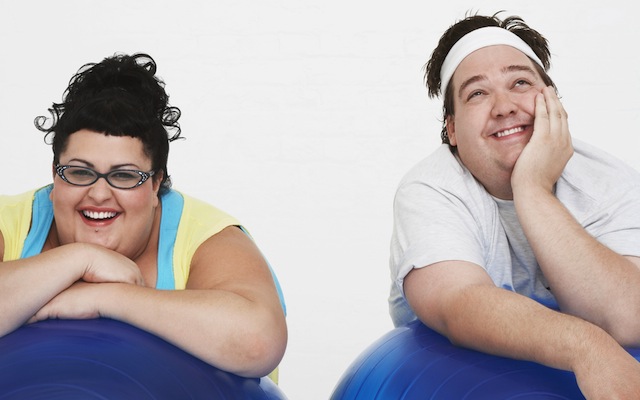
Finally, whatever you do, don’t do it on your own. You’ll have much greater success if you work out with the help or support of friends or loved ones. There’s something to be said for keeping your goals private so you don’t feel bad when you have setbacks (and don’t have to announce your setbacks publicly), but having a support network around you is extremely beneficial. Enrol a personal cheerleading squad, whether it’s online or in person, and start tracking your activities. Don’t use tracking as a way to obsess over results though. As Dick mentioned, obsessing over “steps taken” or “floors climbed” can feel good but can be damaging in the long run when they don’t connect directly with results. You want to keep an eye on your activities and build positive habits.
We’ve talked about some of our favourite fitness-tracking sites, and almost all of them have robust, active communities of people just like you who are working towards similar goals. Sites like Dick Talens’ own Fitocracy take the video game analogy to heart, and turn fitness into a game that earns you points and badges.
Find a workout buddy, or get your spouse or partner to take up the banner of fitness along with you. You’re more likely to be successful if both of you eat well and exercise than if only one of you does. If you need outside help, consider a trainer. They don’t have to be expensive, and they give you the opportunity to work out with someone who won’t judge you, is motivated to help you get in the best possible shape, and understands your lifestyle. If you’re the type who hates exercising with other people around or doesn’t like the idea of a meat market gym full of judgmental glares from skinny people, a trainer might be able to help.
Getting started is everything — and if you can get started on the right foot, your chances of sticking with your changes and making real, long-lasting, meaningful lifestyle changes is that much higher. Before long, your exercise habits will be routine, and the results you’ll see from them (and from proper nutrition), will be side benefits to a healthy lifestyle. It’s the long way, but it’s certainly the best way.
Roger Lawson is a fitness expert and the man behind Rog Law Fitness. You can find him on Twitter at @RogLaw, on Facebook at Rog Law, and subscribe to his YouTube channel, RogLawFitness.
Richard Talens is the Co-Founder and Chief Growth Officer at Fitocracy, a fitness tracking site and social network that’s makes tracking your exercise a real-world game that’s fun to play. You can find him on Twitter at @dicktalens.
Both gentlemen volunteered their expertise for this story, and we thank them.
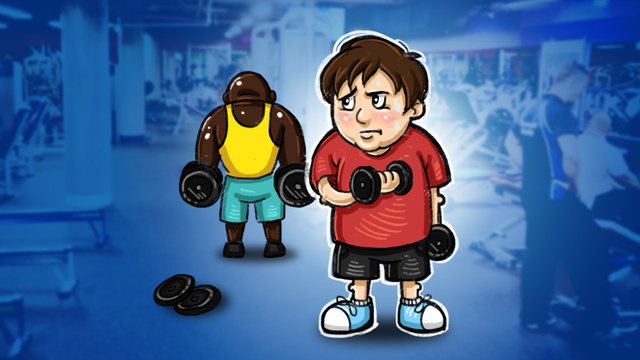
Comments
24 responses to “How To Start Exercising When You’re Already Overweight”
Good article. I think a lot of healthy-weight people don’t realise just how hard even everyday physical activity can be for people who are overweight. When I was 100kg, even walking up a flight of stairs required pausing to get my breath back at least once. When I started exercising I used to go walking at midnight because I was so embarrassed. Nowadays any time I see an overweight person exercising I want to run over and cheer them on, because I know just how hard it is.
It’s not exercise when you are having fun. So I feel that “Gamifying” is a good way to do this. Playing something like Google’s Ingress ( https://play.google.com/store/apps/details?id=com.nianticproject.ingress&hl=en-GB ) where you need to capture and control portals in the real world around you is a lot of fun.
^This.. Also games like Zombies! Run! are a great way to scare you into moving..
In most games, you have the concept of “winning” and “losing”. Losing – or being beaten – is a massive turnoff to exercise in general.
Temple Run and similar apps made a brilliant innovation in that regard: Whether you win or lose individual games (and in Temple Run you always lose individual games) you get to keep your progress towards larger goals.
That approach actually translates well to gameification of exercise. “Exercise every day, if you don’t, you lose” is a quick ticket to screw-this-ville. But a *cumulative* goal of (for example) 20k steps? Maybe you’re aiming for 5k steps per day. But even if you only hit 2k today that still brings you 2k steps closer to your goal of 20k steps so you’ll be back trying again tomorrow. And when you hit 20k? Hmm, 50k is looking pretty doable now,isn’t it?
If you want to really follow the Temple Run model, throw in some bonus achievements to make it more fun. Bonus points for every 100 trees you walk past. Bonus points for hitting your goal in under an hour. Bonus points if your walk takes you to 3 different suburbs. etc.
In fact, the lesson to be learnt from the truly addictive games is probably: have multiple, preferably overlapping goals going at once. In Temple Run you run as far as you can, collecting coins and earning points. For goals you have “run X distance”, “collect X coins”, “earn X points”, “run Y distance in a single run”, “run Z distance without tripping”. The end result is that you are almost always within striking distance of an achievement so it really fosters that “just a little bit more…” mentality.
Skyrim was the same. You’d be progressing multiple quests and advancing multiple skills simultaneously so you were always thiiiis close to one milestone or another.
As an overweight person who has tried dieting / exercise a few times and never got really far, here’s what helped for me so far:
1) Starting a spreadsheet in Google Docs and colouring one cell green for each day I successfully exercise. After a while, the green adds up and looks good. I also use this spreadsheet to track my weight, days I need to go to the gym (3 days a week) and have charts for where I am, where I want to be and how far off I am from getting there. It’s effective.
2) Having some mindless exercises I can do when I don’t really want to exercise. Dumbbells are good, because I can do them while watching TV or even while getting ready for work.
3) Fitocracy. That site is awesome. Like Ingress, it “gamifies” exercise, so you do exercises to gain points and level up. The amount of points depends on the exercise, plus other things like what heart-rate you reach, how much resistance, distance etc.. It also has groups you can join and share ideas. I post in the weight-loss one every now and again, and you get so much positive feedback, good advice and stuff, it’s amazing. Nobody asking you if you even lift bro, just lots of supportive people. I’ve seen people post shirtless progress photos and exclaim that they never felt confident enough to post them on any other site. If that’s not a recommendation, I don’t know what is.
4) Mix the stuff you love, with exercise. I love photography, gadgets and gaming, so I’m planning to head out on photography walks, join the local camera club and get moving. And when I first started my exercise routine this year, I sat on the bike and played some Super Mario World. 30 minutes goes by so quick when you’re really focused on your game.
Start off small, build yourself up and before you know it, good habits and exercise will be part of your day, like brushing your teeth.
This is great
but before you even do any of that exercise prep or any exercise itself theres one important thing to do:
Diet
Diet is a huge factor that determines your weight.
I would personally say based on experience its 80% vs 20% exercise.
Clean up your diet. Do a detox. Plan your meals a week in advance.
Reduce snacking.
eat smaller meals more frequently as opposed to large meals only 2-3 times a day.
Once you have that down pat after 3 weeks, you should have already shed a few KGs and feel re engergised.
That energy will do more good for motivation than any exercise gimmick
after about 8 weeks of diet and just regular easy exercise, the weight just slides off
Progress should not be measured in KG lost but waist size, most people don’t realise that muscle building starts very early in the process of “becoming fit” this can put people off exercising because;
” it’s not working im not losing weight”
“I keep gaining weight rather than losing it”
i wasnt really putting emphasis on the kg
but generally if you look like a whale to begin with, its easier to shed alot of weight fast in the begining.
If only if your starting weight was 80kg or less (depends on if youre male or female and your natural body type) that the muscle issue really comesinto play
I disagree, it varies depending on what type of training you’re doing but generally your body reacts to your exertion. if you’re running short term the body tries to shed weight the easiest way it can ( burning fat) if your body then realises that this is a continual thing it will then begin to produce muscle (This process expends more energy than burning fat).
most people will try to lose weight using aerboic cardio to begin (cycling, walking, running etc) which they expect to make them lose weight, any form of resistance training will build muscle much faster than you lose the fat)
While I agree, I found that if I started the exercise (running), my diet adjusted towards the better, because the awful diet I had previously just wasn’t cutting it for me, as in, I actually started to crave proper foods. I’d get home and want- nay, NEED- to eat a salad and some protein. And I wouldn’t get those later-night cravings for sugar (I’m a HUGE sugar addict). So I’d say it’s a combination of both really.
Plus getting bogged down in the minutiae actually puts me off cause I’m so lazy. If I just do it (exercise) it means I have something to live up to/improve upon/do properly.
this is why i prepare meals in advance so i just need to oven/reheat
im super lazy too!
I have a sweet tooth, plus I have troubles “staying on the wagon”, so diet didn’t really factor into it in the beginning. What mattered to me, was getting a solid exercise routine in, so I could slip a good diet in the middle.
I found that after a few weeks of exercise, my appetite went down. I was eating half the food I used to and the thought of nicking down to the shops to buy an iced coffee was not appealing like it was before.
BUt with that said, I’ve only lost 1kg over the course of a month, but as I said, this was about forming positive habits, with weight loss coming along for the ride.
I am in much the same position.. I just really don’t like that many healthy foods.. Most of my meals are deepfried heh. For me I just made my diet as healthy as possible, without really making any drastic changes to what it is i’m eating and exercise a lot.
For me the trick to reducing portions was a decent fibre supplement as well as a good daily multivitamin. After a week of just these alone, my portion sizes were down half, and at times I felt so ‘full’ that I would be forcing myself to eat a meal because I ‘should eat something.
Ah fiber, I forgot about that. Might have to look in to it, as I don’t think I get enough fiber in my day (or fruit, or veg, or water on some days).
I was able to get healthier lunches in by making them a “grab as I’m running out the door” option. Instead of taking leftovers or going to grab Nando’s, I shove some cruskets in a ziplock bag and take a small tin of tuna. The sweet chilli sort from Aldi is good and tasty enough to where I don’t get bored after eating it for a week solid.
everyone is different. Do whichever works for you =)
im only touting what worked for me
if you weigh alot to begin with, you shed weight faster in kg (but proportionally the same to your overal weight as a % though)
so someone weighing 50kgs will find it harder to shed 1kg vs someone who weighs 100 for example
by focusing on the diet thing (btw i started exercise at the same time) i shed 3kgs in the first week
after about a month and a half i dropped 9kgs. after 3 months its been a stable 11kgs. I have been binging on food without exercise for the past week and havent put on any weight cause of my new higher metabolism 😀
My experience
walking – seriously it sounds stupid, but just increasing the amount of walking you do each day really helps. I’ve started going to a coffee shop a couple of suburbs away and walking both there and back most days, which has been a massive help cutting down weight and making me feel fitter.
give yourself a bit of leeway every now and then with dieting. I found it quite disheartening when I first started my diet that I couldn’t do the things I used to do like have dinners with friends at the weekend. I’d give myself one meal every two weeks where the rule so my diet didn’t apply.
be flexible – doing that walk/run or going to that class at the local park when you don’t feel like doing it at all can sometimes just make everything worse and turn you off exercise. If i miss a day or two for whatever reason I just make up for it later.
Of course it might not be the most efficient method, but its working well for me.
thats definately good advice. Be Flexible and find something you enjoy. everybody is different, some people like running, other despise it. Also dont keep watching the scales, instead jump on them either once a week or once a fortnight. Hoping on the scales everyday will just deflate you.
however the best way to know that your loosing weight is when people who regularly see you notice it and trust me, they will notice it because you wont
Ive been doing Aqua Aerobics 3times aweek since May last year and since september last year ive also been doing a swimfit class twice a week. as such ive dropped from 130kg down to 105kg with goal being 80kg.
the reason why i chose aqua aerobics over regular aerobics is because i have bad knees (arthritis in both knees and my knees regularly jump out of their groove and form a new groove)
Also i massivily reduced my soft drink intake (was 2litres a day now 2litres a week if that) and cook my own food now ( i only order take-out if i forget to take meat out of the freezer to deforst for the following night)
Dat stock photography
As someone who lost 30kg, and went from barely being able to run 1 km to running 20km once a week in about 3 months, I think the most important thing is to get on the path of getting the weight off first and then dialling in the exercise. Sure, if you are 120kg, going for a 30 minute walk will burn some extra calories, but at the end of the day, its easier to not eat that sandwich. Also, exercise makes you hungry, which if you are already overweight, is going to mean you are going to overcompensate. Exercise has no weight loss benefit if all you are doing is burning up the food that you ate that day.
When I lost my weight, I dropped as much weight as I could in the first month (10 kg), and only once that was done did I start ramping up the exercise. At that point your appetite has suppressed from the diet, and your body has become adapted to burning fat instead of the food you eat on a day to day basis (due to the calorie deficit, it takes about 2 weeks for your body to adapt to burning ketones and fat rather than carbohydrates, and you feel like crap until it does). Plus, you are 10kg lighter, but almost as strong as you were when you were 10kg heavier meaning that your joint/muscles/ligaments can actually take a bit of abuse.
Most diet advice is pitched toward women, especially internet pseudo-science about “starvation mode” and the like. Women have far more complex energy requirements then men, revolving around more complicated hormonal balances. A young guy who is fat, but actually has some level of muscle mass (which most guys do), can be far more aggressive with calorie deficits then a woman without a lot of negative effects (as long as they make sure they don’t end up vitamin deficient, and dont stay on massive deficits for too long).
As much as a personal trainer will tell you that exercise causes weight loss, it won’t really, diet causes weight loss. Exercise makes you fit and strong. Calorie deficits caused by exercise are pretty small, and it is going to be hard to stay motivated if you are losing 100 grams a week (it takes a calorie deficit of 7700 or so to lose 1 kg).
I think if you really want it, you need to be aggressive with yourself about it. For me it was almost a period of self flagellation, but in reality, 3 months is not that long of a time (although it feels like it), and it is easily something that is gamified, all you need is a spreadsheet and a GPS tracker. Lose weight everyday or you lose, run faster/further than yesterday or you lose, lift more than yesterday or you lose, apart from a few minor inconsistencies in the data, a beginner, who is fat, should get better every day.
I successfully brought myself down from “overweight” to “average” last year, and it happened like this:
1) Diet. I would attribute the majority of my success to diet. I worked out my TDEE, cut it by 20%, and counted my calories. I lost my first 7kgs or so before I started…
2) Walking. Nice and easy, around the park, 4km or so, most days of the week. Which then led into jogging, and eventually…
3) Personal trainer. I didn’t feel comfortable starting out here, but I guess in retrospective I should have. I started weight training a few days a week, and combined with the jogging and the dieting, the last few kgs fell off. I ended the year at a comfortable 58kgs (I’m 167cm)
I don’t track my calories any more, but I do eat much better than I once did. I don’t see a personal trainer, but I do walk/jog/swim a few times a week, and as soon as I can afford it, I’ll be purchasing some weights for home.
Yeah look great article and hits the nail on the head. It’s not all or nothing, it’s incremental and give your self 6 months or even a year to see great lasting results. My self I’ve lost 15 kg and on track to loose 5 more (20kg total) and training for a marathon. I did this w/o gym membership, PT or crazy diet plan. My advice is setting up your environment for success, have your dumb bells lying around so you can trip over them, have a fitness ball handy so you can do some quick bench presses when you 5 minutes to kill. The more exercise you do the less stress you have and your brain quickly associates these mini work outs and stretching with stress reduction, where in the past my brain was hard wired to seek out sugar specifically ferrero rochers.
On another note, I got my basic diet advice from “in defence of food” by Micheal Pollan. Follow the mantra of “eat, not to much, mainly plants”. Or his book “cooked” where he interviews a food marketer and asks, if you wanted to stop obesity in this food marketed world how, would you do it. The food marketer. “It would be easy, just cook and prepare all your food your self.”
As simple and dumb as it sound it worked a treat. You just become more conscious of what your eating and you appreciate smaller quantities, with more flavor.
Diet, diet, diet – did I mention diet. You will lose far more weight to start with by eating properly & less. Cut out the sugar and reduce the carbs. Avoid high fructose fruits & processed foods. Eat lots of vegetables. Drink lots of water. Eat good fats. Try intermittent fasting and the kilos will just fall off unless you have a medical condition that causes you to be overweight.
Then as you lose weight and burn off the fat, you’ll feel better, lighter, stronger and, of course, more motivated to get out there and exercise. But exercise on its own won’t make much difference, unless it’s high intensity and you do it very regularly.
Carb Nite.
This article is everything I’ve been looking for, thank you, thank you thank you thank you.